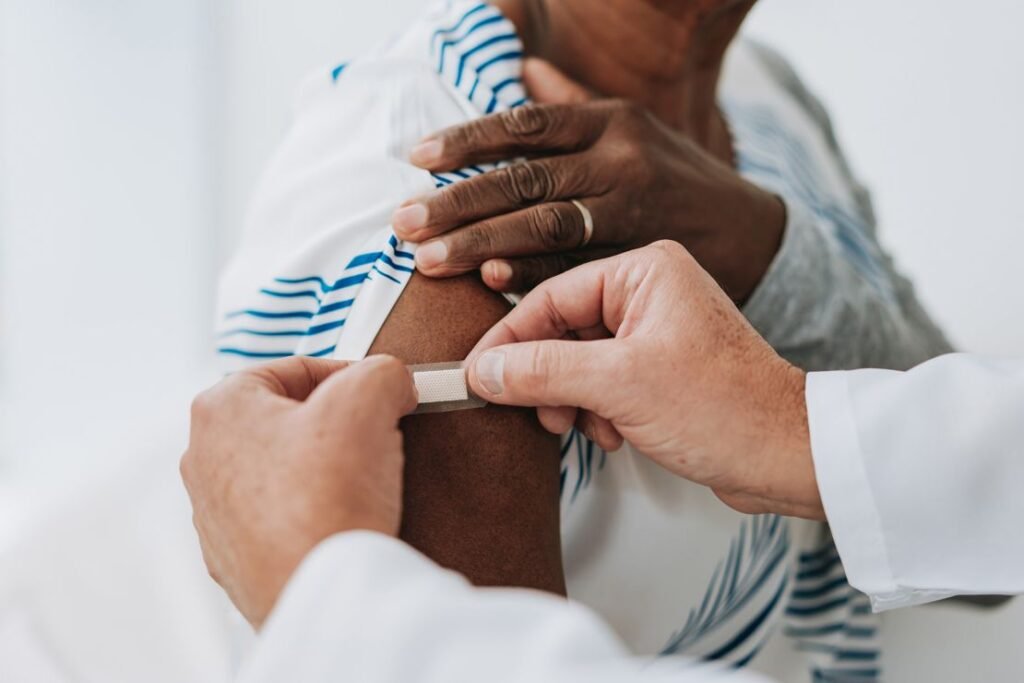
Stephanie Mauro, now 76 years old, has lived with multiple sclerosis for over 40 years. When COVID-19 first emerged in the U.S. in early 2020, her health sharply declined. “I became so sick I wanted to die,” she recalls. “I couldn’t move or function at all.”
Living in Rhode Island, Mauro was taken to a hospital parking lot where makeshift medical tents were set up for COVID patients. She was then admitted to a COVID unit for a week, followed by quarantine in a specialized COVID care facility.
At that time, there was still no vaccine. Scientists were only beginning to understand how the virus spread and how to treat it.
By December 2020, Mauro had recovered and received one of the first available COVID-19 vaccines. Since then, she has continued receiving every booster dose recommended.
“As we age, our immune systems naturally weaken, making us more vulnerable to severe infections,” says Dr. Jeffrey Kopin, Chief Medical Officer at Northwestern Medicine Lake Forest Hospital. “Older adults are particularly at risk, especially if they have underlying conditions.”
While vaccines may not completely prevent infection, they significantly reduce the risk of severe illness, hospitalization, and death.
Why Vaccination Matters for Older Adults
Respiratory illnesses like COVID-19, influenza, and respiratory syncytial virus (RSV) spread easily through airborne droplets released when someone coughs, sneezes, talks, or even breathes.
Symptoms often include fever, cough, congestion, and fatigue. These viruses can seriously affect the lungs and other organs involved in breathing — particularly in older adults whose immune defenses are weaker.
Vaccines are especially critical for older adults because:
-
They boost immune response: Vaccines stimulate the production of antibodies that help the body recognize and fight viruses more effectively.
-
They reduce severity: Vaccinated individuals are far less likely to experience severe outcomes compared to unvaccinated people.
-
Chronic conditions increase risk: Health issues like heart disease, obesity, or diabetes can further compromise the immune system.
-
Living environments matter: Many older adults live in communal settings like nursing homes, where infections spread quickly.
“Vaccines may not always stop illness entirely,” Dr. Kopin adds, “but they clearly prevent many hospitalizations and deaths among older adults.”
1. COVID-19 and Older Adults
COVID-19, caused by the coronavirus SARS-CoV-2, has led to millions of deaths worldwide since it first appeared in December 2019. While some experience mild symptoms, older adults are at significantly higher risk of serious complications.
According to the CDC, individuals aged 65 and older account for a large proportion of hospitalizations and deaths from COVID-19 due to age-related immune decline.
Possible complications include:
-
Respiratory failure
-
Long-term lung or heart damage
-
Neurological problems
-
Kidney failure
-
Death
Vaccination is the most effective defense.
COVID-19 Vaccination Schedule for Older Adults
The CDC recommends that older adults receive:
-
A primary COVID-19 vaccine series (usually two doses, spaced several weeks apart)
-
Regular booster shots, especially as the virus continues to mutate and immunity from previous vaccines wanes
Immunity typically takes a few weeks to build after each shot, so keeping up with boosters is essential
